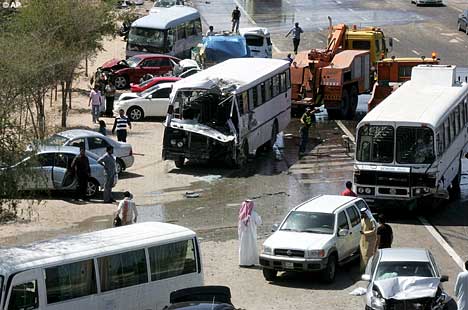CAIRO: For many years, the Nile River has been Egypt’s main vein, acting as a source of water, food and even leisure. However, soon the Nile will play another pivotal role for Egyptians as the private sector shows interest in investing in river transportation.
Citadel Capital, one of the leading private equity firms in Egypt and MENA region, founded Greenfield projects in 2008 that will develop a comprehensive transportation and logistics network using the Nile River.
The National River Transport Company (NRTC) and the National River Port Management Company (NRPMC) are two Citadel Capital platform companies with a committed capital of $80 million.
NRTC and NRPMC together are expected to transport up to 15 million tons of goods along the Nile annually by 2012.
“Now we have 31 barges working and running, a figure that will increase to 91 within four years, as we are now building 30 more barges in the Alexandria Shipyard, and another 32 in Arab Contractors Shipyard in Helwan, Yasser Areeda, NRTC’s managing director, told Daily News Egypt in a phone interview.
The Egyptian government had started paying attention to river transportation in 2004, building locks and working on the bridging to improve the smooth navigation between the Delta and Upper Egypt.
Three main reasons encouraged CC to invest in this field; river transportation is “the best environment-friendly way of [goods] transportation, it’s cost-efficient and it’s very safe compared to the high rate of road accidents in Egypt, Areeda said.
Currently, there are 250 tons of goods and products being transported between different governorates in Egypt, 95 percent via trucks and 4 percent through the railways.
Different types of commodities are transported from Upper Egypt to the north, the granite from Aswan, grains, dates and others.
With fuel prices forecast to rise in the long term and continuing pressure on the government to reduce fuel subsidies, Areeda emphasizes the NRTC’s role of Corporate Social Responsibility (CSR).
“River transportation saves 40 percent of the fuel, and you know that truck diesel is subsidized by the government, the math will tell how much will be saved of the subsidies budget by shifting to river transportation.
CC is not the only player in the market. Early last month, Beltone Financial, a leading investment bank in Egypt, signed a Memorandum of Understanding (MoU) for a partnership with a subsidiary of EgyTrans, a publicly listed Egyptian company, for a river transportation project through establishing a new company worth LE 150 million.
Earlier, EgyTrans had signed another MoU with the General Authority of River Transportation to obtain rights to establish a river port for trading and transporting containers in the Greater Cairo area.
EgyTrans will launch the project after obtaining necessary operation licenses.
The main challenge facing the river transportation business remains the depth of the river. “The depth of the river is between 2.5 to 3 meters [in other countries] and now the Nile River is 1.6 meters deep. In order to venture into the [river transportation] business, the Nile River needs to be at least 2.2 meters deep, Areeda said.
The low cost of river transportation in comparison to other conventional means has already attracted investors.
“The cost of river transportation is around 10 percent of the terrestrial, said Mohamed Al-Feky, Egyptian Investor who bought one river port recently.
“One load of a barge, which has 500 tons, equals that of 14 trucks, and now Citadel is building sandals that will have 1,000 tons, Al-Feky added.
The load of the new generation of barges will be 1,600 tons; “this is equal to the load of 50 tucks, Areeda said.
Al-Feky bought Al-Tebeen port, south of Cairo, a few months ago with other investors.
Al-Feky and his partners paid LE 50 million for the land, the whole project and reactivating the port will cost them another LE 250 million, “but now we decided not to invest anymore until the bridging process, he said.
The government promised to get the course of the river ready before the end of 2010. “When the work is done and the port is up and running we are expecting LE 30 million return on investment a year, Al-Feky said.
Al-Feky works in wood production; he owns factories in Kom Ombo and Naga Hamadi.
“With the economic developments taking place now in Upper Egypt and with more industrial zones, developing river transportation is a must, Al-Feky said.


